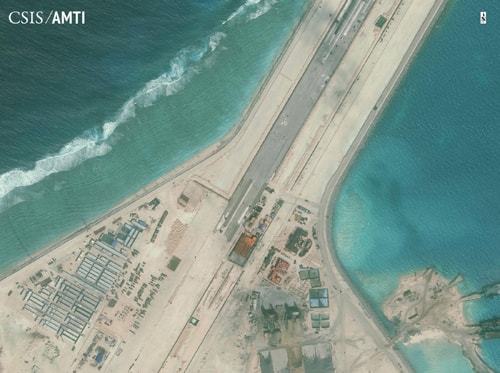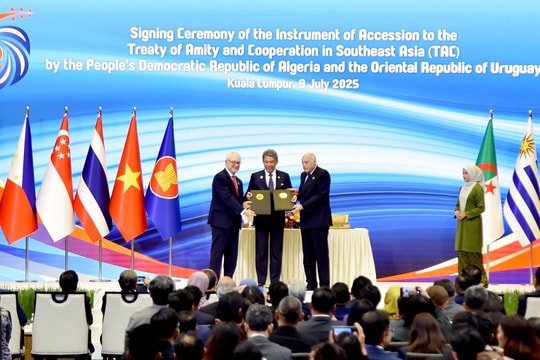China's ridiculous argument to reject the South China Sea ruling
Beijing deliberately ignored Article 288(4) of UNCLOS to give vague reasons to reject the international court's jurisdiction to adjudicate the "nine-dash line" lawsuit.
 |
Admiral Sun Jianguo (in white shirt), head of the Chinese delegation, speaks at the Shangri-La Dialogue. Photo: Reuters. |
At the Shangri-La Dialogue held in Singapore last weekend, Chinese military officials bluntly declared that the country will not comply with the upcoming ruling of the Permanent Court of Arbitration (PCA) - a United Nations agency - on the East Sea issue, according to Reuters.
Previously, the Philippines filed a lawsuit at the PCA against the unreasonable "nine-dash line" that China unilaterally drew in the East Sea to serve its excessive sovereignty ambitions. Beijing firmly refused to participate in the lawsuit, ignored the PCA's request for litigation, and declared that it did not recognize the jurisdiction of this international court sponsored by the United Nations.
When the PCA announced its final ruling in June, China sought to undermine the value of the ruling by launching a diplomatic and lobbying campaign across much of the world to convince countries to support its assertive actions.
After convincing Russia, Cambodia, and Laos to support its stance of resolving the East Sea dispute through bilateral negotiations and not "internationalizing the issue," China turned to attract African countries. Xinhua reported on June 6 that Tanzania, Uganda, Eritrea, Comoros, and the African Union (AU) also issued statements supporting China's stance.
However, according to Professor Julian Ku of Hofstra University School of Law (USA), co-founder of Opinio Juris - the world's leading website on international law, while the Philippines' lawsuit has very solid legal grounds, China's continuous declaration of ignoring the PCA's ruling is not only wrong but also "unacceptable" from a legal perspective.
In an article on the LawFare website, as a leading expert on international law, Professor Ku said that the arguments China has put forward to reject the PCA's jurisdiction as well as the value of the court's East Sea ruling are very weak, even "ridiculous".
Chinese diplomats and scholars have repeatedly stated that Beijing has no obligation to comply with the ruling of the UN arbitration court, because they believe that the court's jurisdiction does not include disputes over "sovereignty or territory".
Chinese officials also brazenly said that ignoring the PCA's ruling was a necessary action to "protect and maintain international law," while accusing the Philippines of "violating" international law in conducting the lawsuit.
According to Professor Ku, this argument of China is completely invalid for a very simple reason. They have deliberately ignored Article 288(4) of the United Nations Convention on the Law of the Sea (UNCLOS), which stipulates: "in a dispute, the jurisdiction of the court shall be considered and decided by that court." This provision means that only the PCA has the right to decide whether the Philippines' lawsuit falls under its jurisdiction or not, not China.
In this case, the PCA spent more than a year just to consider its jurisdiction, and decided that 7 out of 15 requests in the Philippines' case were within the court's jurisdiction.
When China ratified UNCLOS in 1996, it fully agreed to abide by the dispute settlement under Article 296, which provides that “Any decision rendered by a competent court or tribunal shall be final and shall be complied with by all the parties to the dispute.”
 |
Professor Julian Ku speaks at an international conference. Photo: Lawnews. |
Mr Ku pointed out that China could only reject an international court's ruling if the court declared it had no jurisdiction to hear the case. The "binding" nature of the international court's ruling was agreed to by China when it ratified UNCLOS, and it had no reason to reject it.
Intentionally ignore
This professor pointed out that up to now, Chinese officials and scholars when discussing the jurisdiction of the PCA have completely ignored Article 288(4), and have not given any explanation as to why China is not bound by such clear and transparent words.
The defense that is considered closest to reality was offered by Xu Hong, director general of the Chinese Foreign Ministry’s Department of Law and Treaties, last month, according to Mr. Ku. Xu argued that countries have the right to accept or not to participate in a lawsuit, and that China “has no obligation to participate in provocative proceedings.”
He also said that many other countries had also refused to participate in the "illegally initiated" international court, and that this was not an action that China had come up with. However, Mr. Tu did not point out a single case to prove his statement.
According to Professor Ku, Mr. Tu may be referring to the case of the US government refusing to participate in the trial presided over by the International Court of Justice regarding Nicaragua's lawsuit related to US paramilitary activities against the government of this country in 1985. However, this is not a "good precedent" for China, because this decision of the US government has met with fierce opposition from international public opinion, and the US Congress also decided to ban the White House from continuing to provide military support to rebel groups in Nicaragua.
The expert pointed out that the danger is that although China's arguments are very weak in legal terms, Chinese officials, scholars, and reporters continuously repeat that tone in international forums in a "slow and steady" tactic, causing outsiders to gradually see Beijing's views as convincing or at least acceptable.
In fact, at the World Economic Forum in Malaysia last week, George Yeo, Singapore's former foreign minister, appeared to accept China's argument, stating that countries "should not underestimate the legitimacy of China's reasoning."
 |
China's illegal construction of artificial islands in the East Sea has met with strong reactions from the international community. Photo: CSIS. |
Moreover, if China insists on not complying with the ruling, the PCA does not have the necessary coercive tools to force it to comply. Beijing has succeeded in getting about 40 countries in the world to recognize that China, not the Philippines, is the country that complies with international law.
However, Mr. Ku pointed out that ultimately, the weight of China's claims still has to be based on legal bases, and without these bases, China's international reputation will be seriously affected. It is important that the international community use Article 288(4) to have a simple, clear response to China's ambiguous and unclear justifications for not complying with the South China Sea ruling, Professor Ku emphasized.
According to VNE
| RELATED NEWS |
|---|





